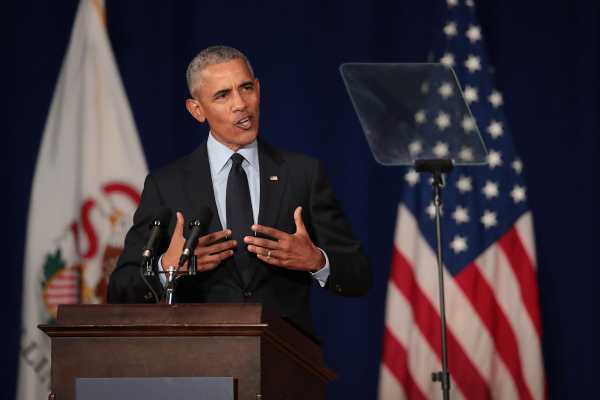
Barack Obama stepped back into the fray on Friday with a ferocious speech aimed squarely at not only his successor in the White House but the entire Republican Party.
The ex-president uttered the name “Donald Trump” for the first time in public since Trump’s inauguration in his speech at the University of Illinois at Urbana-Champaign. Obama chastised a politics of fear and resentment, but argued that Trump himself was “a symptom, not the cause.”
“It did not start with Donald Trump,” he said. “He’s just capitalizing on resentments that politicians have been fanning for years, a fear and anger that’s rooted in our past, but it’s also born out of the enormous upheavals that have taken place in your brief lifetimes.”
The speech reintroduced the president to American voters just before he begins campaigning earnestly for Democratic candidates in the 2018 midterms. Obama sought to portray the November elections as an opportunity to regain “some semblance of sanity to our politics.” He even spoke positively of emerging progressive policies, like Medicare-for-all, that he would not have endorsed in his more center-left administration.
But more than anything, Obama abandoned the posture he’s cultivated over the past 18 months as an elder statesman who largely stays out of the ruckus and refrains from directly criticizing Trump or Republicans in Congress. In doing so, he seemed to hope to convey a sense of urgency, arguing that the republic is at a crossroads and it will require a mobilized body politic to change direction.
“This is not normal. These are extraordinary times, and they’re dangerous times,” Obama said. “But here’s the good news. In two months we have the chance, not the certainty, but the chance to restore some semblance of sanity to our politics.”
Here are seven key moments from the speech:
“Demagogues promise simple fixes to complex problems”
Obama criticized Trump and Republicans more directly than he ordinarily would, but he still placed the current politics of resentment — the coded racial language, the dehumanizing of the Other, and the fear-mongering in what is actually the safest time in recent history to live in America — in a grander historical context.
“America’s dark history of racial and ethnic and religious division,” Obama said, is a tale “as old as time.” And he heavily implied that Trump follows in those demagogic footsteps:
“What happened to the Republican Party?”
Obama’s rise to the presidency began, in earnest, with his 2004 Democratic National Convention speech professing his belief that there was not a Red America or a Blue America — that there is more that unites Americans than divides them. He has therefore been reluctant throughout his career to paint too broadly in his critiques of his political opponents.
But on Friday, he asked very bluntly: “What happened to the Republican Party?”
Republicans passed a tax bill that exploded the deficit by $1.5 trillion, Obama noted. Anti-communism used to be the rallying cry of the conservative, pro-capitalism movement in America and yet now they seem perfectly comfortable with Putin, a holdover Soviet spy, running Russia. Or they’re at least willing to ignore Trump’s comfort with him.
“That’s not how our democracy’s supposed to work”
Obama didn’t name the recent New York Times op-ed by an anonymous Trump official directly, but his allusion seemed clear as he warned against putting hope in unaccountable, unelected bureaucrats to protect the country from Trump’s worst impulses.
“Walls don’t keep out threats like terrorism or disease”
The proud policy wonk of a president couldn’t help but add a policy critique, praising emerging Democratic proposals like Medicare-for-all or giving workers seat on corporate boards — a rhetorical embrace of a much more leftist politics than Obama himself ever pursued in office.
“What’s going to fix our democracy is you”
Obama’s speech was officially the kickoff to his campaigning for Democratic candidates in the midterm elections. He treated it, therefore, as a call to action. It was an unsubtle challenge to progressive Democrats who might have been unenthused about Hillary Clinton or suburban Republicans uncomfortable with Trump but who voted the party line.
“How hard can that be? Saying that Nazis are bad?”
But Barack Obama is still Barack Obama. As he turned into the home stretch of his speech, the former president could not help but reaffirm his faith in a kind of post-partisan politics.
He called on people of all parties to be properly offended by the resurgence of white nationalism in mainstream politics or the appeasement of neo-Nazis by the president of the United States and people close to him.
“We’re supposed to stand up to discrimination, and we’re sure as heck supposed to stand up clearly and unequivocally to Nazi sympathizers,” Obama said. “How hard can that be? Saying that Nazis are bad?”
“I was intent on following a wise American tradition of ex-presidents gracefully exiting the political stage”
Obama actually began his address by explaining, in his unique way, why it had taken nearly two years for him to make such a speech.
Sourse: vox.com






